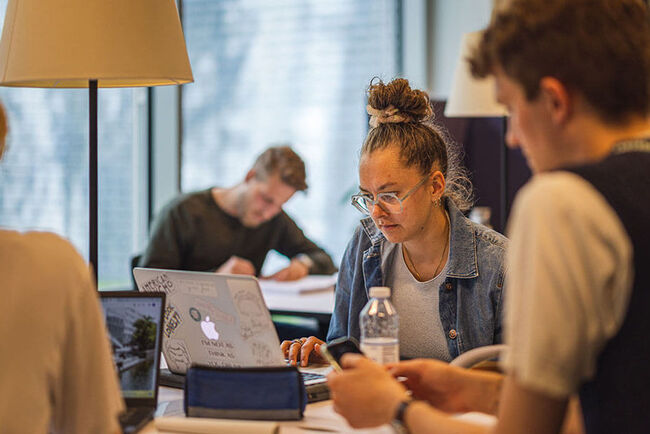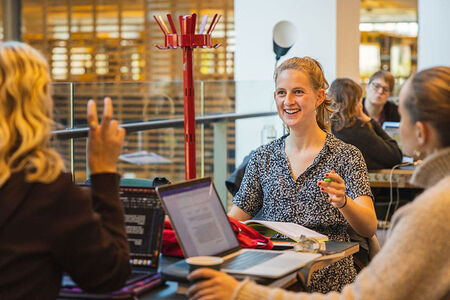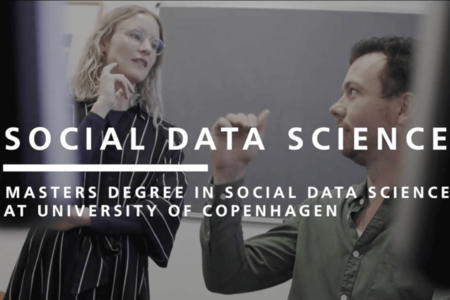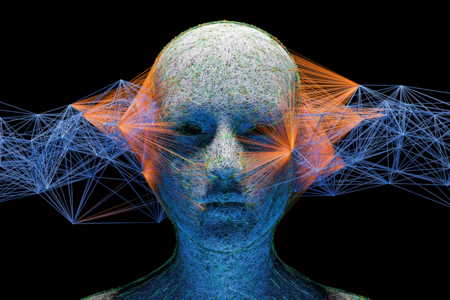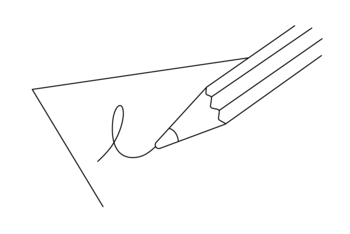About the programme
Do you wish to excel in developing advanced cognitive technologies? And use knowledge of language and human cognition, and identify new interesting applications of cognitive models?
At this exclusive and interdisciplinary MSc programme you will learn to deal with the complexity of human language, vision and cognition and design innovative and intelligent information and communication technology (ICT).
What makes the programme at UCPH unique?
We equip students with the knowledge required to work with and to develop cutting-edge technologies behind currently used computational models, such as Large Language Models, voice assistants, self-driving cars, and so on. Besides, the interdisciplinary nature of students makes the programme unique and a great opportunity for scientific advancement.Why is this programme relevant?
This programme will equip you with the tools required to understand and develop current cognitively inspired computational models. Both industry and academia require skilled workers in this area, and therefore, students graduating here would be expected to be employed quite rapidly.Admission and application
To apply for admission to this master's degree programme, you must have completed a qualifying bachelor’s degree or a similar Danish or international degree programme which is assessed to be relevant. Apply for admission via the application portal.
Below, you can read more about admission requirements and which documents to upload in the application portal.
Academic admission requirements
Here you'll find the different academic requirements depending on which qualifying degree you hold.
Academic admission requirements
If you hold one of the degrees listed below, you are considered to automatically meet the requirements regarding relevance of academic qualifications:
- Any Bachelor's degree within computer science from the University of Copenhagen, Aarhus University, The Technical University of Denmark, Aalborg University or University of Southern Denmark
- Any Bachelor's degree within humanities including at least 15 ECTS credits in subjects within one or more of the following disciplines: Language Technology, Computer Science, Cognitive Science, and Linguistics from the University of Copenhagen, Aarhus University, Aalborg University or University of Southern Denmark
- BSc in Software Development or Data Science from the IT University of Copenhagen
- BSc in Cognitive data science from the University of Copenhagen.
Applicants with other bachelor's degrees are also eligible to apply for admission to the programme.
The faculty may admit applicants with other bachelor's degrees if it is assessed that the applicant has a bachelor’s degree with at least 15 ECTS in subjects within one or more of the following disciplines: Language Technology, Computer Science, Cognitive Science, and Linguistics.
In order to proceed with your application, please refer to the application procedure.
Language requirements
You are required to document that you fulfil the language requirement English B, unless you have a legal right of admission to the programme you are applying for.
Please note that you must have the documentation ready by the application deadline.
Application deadlines
Study start in September
1 March at 23:59
Application deadline for Danish applicants and applicants from within the EU, EEA and Switzerland.
Open for applications from 16 January. You will receive a reply by 15 May.
15 January at 23:59
Application deadline for applicants from outside the EU, EEA and Switzerland.
Open for applications from 15 November. You will receive a reply by 13 March.
How to apply
Choose your category and read how to apply for admission. You can also find information about deadlines and documentation requirements.
Please note that you must also select according to your citizenship:
- Citizen from Denmark, EU, EEA or Switzerland (EU)
- Citizen from countries outside EU, EEA or Switzerland (NON-EU)
If you are a citizen in Denmark, EU, EEA or Switzerland
If you are a citizen in a country outside EU
Have you been enrolled before?
If you already hold a master’s degree or completed master’s level courses you must be aware of the following rules:
I have completed a master’s degree
If you have already completed a master's degree corresponding to a Danish master’s degree please refer to the rules concerning a second degree.
I have completed individual master’s level courses
If you previously completed master’s level courses, you must inform the Faculty of Humanities in your application when applying for admission to the programme.
You must include documentation for your completed courses. The Faculty of Humanities assess if your credits can be transferred after admission to the programme.
How your application is assessed
Prioritisation of applicants
Admission to the programme is competitive and limited to 40 students.
The applicants who meet the academic requirements will be evaluated and ranked in accordance to the selection criteria below. The specified percentage is to show the weighted relevance of each criteria when the application is evaluated. If the number of qualified applicants exceeds the maximum student intake, students will be selected on the basis of their ranking. The highest ranked of the qualified applicants get an offer to join the programme.
Selection criteria
- Information provided in the Letter of Academic Relevance. (30%)
- An evaluation of education and vocational experience. (40%)
- Grades for bachelor courses relevant to the MSc in IT and Cognition, i.e. in the following disciplines (30%):
- Language Technology
- Computer Science
- Cognitive Science
- Linguistics
You are required to provide a separate list of 3-6 courses that you find relevant for the MSc in IT & Cognition.
| Admission statistics IT and Cognition 2025 | |
|---|---|
| Admitted (of which have start in February) | 36 (0) |
| Admission distribution (legal right/other) | 0% / 100% |
| Applicants | 326 |
| Age average | 23 |
| Nationality (dk/international) | 8% / 92% |
Programme structure
Teaching
The MSc in IT and Cognition emphasises technical cutting-edge innovation grounded in deep knowledge of human cognition. The study programme combines cognitive and technical courses with a focus on statistical modelling and natural language processing and is designed to provide candidates with competencies that are useful in both research and business careers. The courses in the IT and Cognition programme use different teaching formats; they include class instruction, so-called "shared tasks", lectures, supervision, and project and group work
Guest Lectures, Individual Interviews and Supervision
Since the programme is very exclusive, the staff offers considerable guidance and support, incl. individual interviews and supervision, guest lectures, supervision of voluntary research projects and the organisation of student workshops. The individual interviews are used to continuously evaluate the study programme, to supervise the students and to be able to better recruit students for research projects and collaborations with industry.
Past guest lectures have, for example, been about language acquisition, authorship attribution, epistemic logic, learning mathematics, social media processing and visual attention. We invite both researchers and industry partners to give guest lectures
Programme Structure
The MSc programme in IT and Cognition consists of cognitive and technical courses. In the first year, students gain knowledge of image and text processing, scientific programming, machine learning, data structures and search algorithms, as well as an understanding of computational modelling methodology in cognitive science.
In the third semester, students specialise by taking selective courses offered by the Center for Language Technology or the Department of Computer Science, or by taking courses at other Danish universities or abroad. IT & Cognition students have, for example, taken semesters at University of Amsterdam and University of Edinburgh.
The table below illustrates how the subject elements are distributed across the semesters.
Year 1
| Semester 1 | Semester 2 |
|---|---|
| Computational Cognitive Science I (7.5 ECTS) | Computational Cognitive Science II (7.5 ECTS) |
| Scientific Programming (7.5 ECTS) | Introduction to Data Science (7.5 ECTS) |
| Language Processing I (7.5 ECTS) | Language Processing II (7.5 ECTS) |
| Vision and Image Processing (7.5 ECTS) | Specialisation I (7.5 ECTS) |
Year 2
| Semester 3 | Semester 4 |
|---|---|
| Computational Cognitive Science III (7.5 ECTS) | Master's thesis (30 ECTS) |
|
You can choose specialisation courses within the compulsory subject elements:
- Language Processing
- Computational Cognitive Science
- Data Science
- Vision and Image Processing
And you will also be able to choose courses within the following subject areas:
- Programming Languages and Systems
- Software Development
- Digital Interactive Entertainment
- Computer Science Innovation
- Algorithms and Data Structures
Research
The IT and Cognition programme is research-based, which means that the lecturers are engaged in cutting-edge research in cognitive and computational modelling. Read more about cognitive and computational modelling research at the University of Copenhagen:
- Centre for Language Technology
- Image Analysis, Computational Modelling, and Geometry Section in the Department of Computer Science
- Natural Language Processing in the Department of Computer Science
- Multimodal communication and multimodal interfaces in the Nordic network MUMIN
Programme Curriculum
On this page, we present both key elements from the curriculum and other content that may be relevant to your choice of study.
If you are interested in a more detailed overview of the framework of the programme in more detail – including its academic content, structure, rules, and examination requirements – you should refer to the curriculum, which serves as the legal foundation for the programme.
There is both a curriculum specific to each degree programme and a general curriculum that applies across the faculty.
Please note that curricula are often revised annually. Any new versions will be published no later than during the spring semester.
Career opportunities
Upon completion of the master’s programme, you will obtain the title Master of Science in Information Technology (IT and Cognition).
Candidates will be interesting to industry as well as research, and are popular in both places. They typically work with cognitive technologies in the industry or do frontier research in image and language processing or related areas.
The reason is, of course, that computational modelling becomes more and more important in research, and that in order to create good IT products it is important to know what, cognitively speaking, is easy and difficult for people to understand. This knowledge can help create information and communication technology that can make users' daily lives and workflows easier and facilitate the implementation of new products to achieve greater efficiency and user satisfaction.
Our past students have jobs at places like SAS Institute, Gallup, Textkernel, or continue their studies in PhD programs at universities in Denmark or elsewhere.
IT and Cognition is an interdisciplinary Master's programme where students work with technologies that shape the future. Cutting-edge information and communication technologies not only require technical innovation, but also deep knowledge of language, vision and other aspects of human cognition. For a computer to play Jeopardy, drive a car, or summarise a newspaper article it must mimic human cognitive processes to some extent.
The MSc in IT and Cognition at the University of Copenhagen is a very exclusive programme for a small group of talented and focused students who wish to excel in developing advanced cognitive technologies. Students will learn to deal with the complexity of human language, vision and cognition, design innovative and intelligent information and communication technology (ICT) using knowledge of language and human cognition, and identify new interesting applications of cognitive models. In the MSc programme students are presented with cutting-edge technologies such as natural language parsing, object recognition, virtual agents, machine translation, or visual scene analysis.
If you are interested in cognitive phenomena such as memory, attention, visual recognition or language, are keen on interdisciplinary study and want to improve your IT skills, this is the programme for you.
Computational modelling plays a central role in the programme, because computational modelling is important to cognitive research for evaluating theories, and because computational modelling of cognitive processes is important to push the frontiers of information and communication technology. Technologies such as Google Talk translation bots, brain-computer interaction or Google's Driverless Car are examples of computational modelling of cognitive processes that is likely to change the future.
Fiammetta worked as a data scientist and is now pursuing a PhD at DTU.
Student life
Students of IT and Cognition experience an inspiring international study environment with much support from senior fellow students (tutors) and staff members (supervisors). Since most teaching takes place at the Southern Campus of University of Copenhagen (known as Søndre Campus), most study facilities are located here and are provided by The Department of Nordic Research.
Social events include evening guest lectures, group excursions, and holiday dinners.
IT and Cognition Guest Lectures
The IT and Cognition Guest Lectures serve an academic purpose, as well as a social purpose. Speakers are researchers in related fields or interesting industry partners, and the lectures are typically in the evening. The tradition is to go for a drink by the water front afterwards.
Libraries
The Departmental libraries
There are nine departmental libraries on South Campus. The Saxo library holds the collections and academic litterature for Prehistoric Archaeology, Classical Archaeology, Ethnology, Greek & Latin, History, Applied Cultural Analysis and Advanced Migration Studies. You can find information about the all the departmental libraries and the opening hours here.
The Royal Library on South Campus
The campus branch of the Royal Library houses an extensive collection on the humanities, has free wireless internet access, and contains 400 workspaces for students to study.
The Royal Library
The main branch of the Royal library is a popular and centrally located harbourfront place for students to study. It has free wireless internet and numerous workspaces for study, and also houses art and photo exhibitions. Visit the Royal Library website.
Student Life on Campus
South Campus at University of Copenhagen offers several cosy meeting points for students. Students at the faculty use the cafés during their breaks to meet up with fellow students or even lecturers. In the evenings the Faculty is often used for cultural events and café nights.
Mødestedet ("The Meeting Point")
This café offers coffee, hot chocolate, cold beer, light lunches and a variety of confectionery. The café stocks various games and has its own pool table.
Departmental cafés
Each department at the Faculty of Humanities has a student café, run by student volunteers from the department. The cafés offer a cosy environment where you can meet fellow students, read newspapers, play board games and buy cheap coffee and snacks. Student groups arrange study circles with representations from authors, artists and intellectuals and mutual discussions of relevant academic subjects. Furthermore the student cafés arrange Friday café nights often with different themes. There are often international student cafés during the semester where you'll get the opportunity to meet other international students and their mentors. We definitely recommend you to experience the atmosphere of the student cafés as the social life of many Danish student revolves around these cafés.
Student parties
Most of the departments at the faculty have a party committee which arrange parties and other social events.
Your student identity card gives you access to all student parties at the faculty - also at other departments than the one you are enrolled at. Usually, it is possible to bring a guest under the condition that you have obtained a guest ticket from the organisers of the party. Faculty parties are announced through posters on campus.
Sports and student associations and clubs
There is a wide range of associations and clubs at University of Copenhagen. The associations and clubs can be found within all levels of University of Copenhagen. Please visit byStudents' list of more than 100 different associations and
organisations.
To find more local associations on department or programme level, please refer to your department, posters on campus, social media and your fellow students.
The students' sports association is KSI (University of Copenhagen student sports association). Signing up normally takes place in August, although it is possible to join at later dates if slots are free on the teams. KSI offers a wide range of different disciplines both on the southern campus and on other locations around Copenhagen. To find information about programmes, prices and contact please visit the KSI website.
Finding Housing
If you are looking for a place to live you can visit University of Copenhagen general information about finding housing.
Read about student life at UCPH
What is student life like across the rest of the University of Copenhagen?
Find out where you can live, get more information about student grants (SU), student jobs, student discounts, and all the many other things that are part of student life.

Get to know South Campus
Teaching takes place at South Campus, which is located at Islands Brygge on Amager.
Around 15,000 students are enrolled in one of the more than 100 degree programmes based at South Campus.
Contact student guidance
Questions about study choice and admission
Our student guidance are ready to assist you with answers to your questions about:
- application procedure and the digital application portal
- admission- and language requirements
- documentation
- study life
- career opportunities
- study choice or doubts
Did you not find what you were looking for?
You can find answers to questions most often asked by potential students in the FAQ. Read the FAQ
Questions about the digital application-portal?
Do you have questions about digital application? Check our user guide to the application portal.
In case of technical problems, please contact the IT-support by
- Mail: it-service@adm.ku.dk // Tel: +45 35 32 32 32
Location
- South Campus, Karen Blixens Plads 8, DK-2300 København S.
